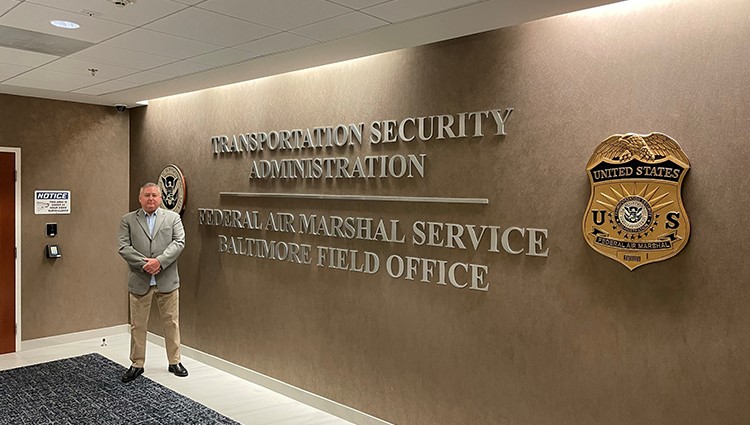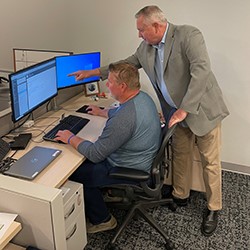
While TSA officers have the job of keeping potentially dangerous prohibited items off airplanes, the agency’s Federal Air Marshals (FAMs) protect the traveling public both on the ground and in the air in many different ways.
And it can be a dangerous job.
TSA’s Law Enforcement/Federal Air Marshal Service (LE/FAMS) is an innovative, risk- and intelligence-based federal law enforcement organization, deploying FAMs to assess, address and mitigate various risks and threats to transportation and travelers, not only here in the U.S. but around the world.
FAMs carry out in-flight security missions aboard aircraft with the traveling public domestically and internationally. They perform crucial law enforcement responsibilities within airports, trains, bus stations and other venues to make sure our aviation and surface transportation systems are safe and secure.
SFAM James O’Donnell
Next month marks 22 years of service at TSA for James O’Donnell who joined LE/FAMS in the Newark, New Jersey, Field Office and worked his way up to his current position of Supervisory Federal Air Marshal (SFAM) in Baltimore.

“I joined FAMS after the 9/11 attacks in 2001,” O’Donnell said. “Watching the attacks on TV inspired me and several other Baltimore police officers to join FAMS, because we didn’t want to see that kind of attack happen again. I believed we could use our skills as law enforcement officers to prevent another attack.”
O’Donnell is currently the Operations Section supervisor for the Baltimore Field Office and the SFAM who oversees FAMs assigned to the FBI Joint Terrorism Task Force (JTTF) in Baltimore where he was a major narcotics investigator before joining TSA.
“The Operations Section is the heart of a field office,” said O’Donnell. “We work on almost every aspect of a FAM’s scheduling from flight schedules, days off, annual leave, local and specialized training, border deployments, special mission coverages, and international deployments. Overseeing the FAM assigned to the FBI JTTF, I ensure the Supervisory Air Marshal in Charge (SAC) receives pertinent information on investigations which affect BWI Airport and all transportation-related investigations conducted by the FBI and FAMS.”
His inspiration is supporting the mission-focused FAM.
“If I can make their lives a bit easier by making a schedule change or providing some insight to them, which helps them complete their mission, then I’ve done my job,” O’Donnell emphasized. “The best part of my job is working with so many great people, knowing they have my back and being able to improve the quality of life for FAMs by making accommodations and adjustments in scheduling to ensure the mission is carried out, but also giving them time to be at home with loved ones.”
What does a typical day look like for the Baltimore SFAM?

“Checking with the Baltimore Operations team to see what the travel schedule for the day looks like and to gather all of the data on what is happening throughout the entire field office from who is in training to where the Visible Intermodal Prevention and Response team is deployed, then reporting the information to the SAC,” replied O’Donnell. “I report any anomalies or incidents to the SAC and provide any guidance to FAMs who are deployed so office operations move smoothly.”
Without the Operations Section doing what they do every day, O’Donnell said the FAM’s job would be very sporadic and unorganized.
“A lot of prep work goes into the scheduling and accounting of FAMs’ daily mission operations,” he added.
He also said partnerships are key to a successful operation.
“Every day, our partners in law enforcement travel through BWI, and we often assist them with VIPs and flying armed protection details,” O’Donnell explained. “We often make arrangements to assist armed agents traveling. We also have a collaborative relationship with our airport police and have hosted training for hundreds of local police officers on airport procedures and making arrests on aircraft.”
For anyone interested in joining the Law Enforcement/Federal Air Marshal Service, O’Donnell recommends they first talk to a FAM to find out what they do.
“There are a lot of opportunities for career development within the FAMS,” he said. “Things are always being developed inside FAMS missions. I’ve had a great career with the FAMS, but it’s not for everyone. You need to be prepared for mission assignments with minimal lead time and time away from home at some important times. However, what we do is critical to securing the nation’s transportation systems domestically and abroad.”
By Don Wagner, TSA Strategic Communications & Public Affairs
